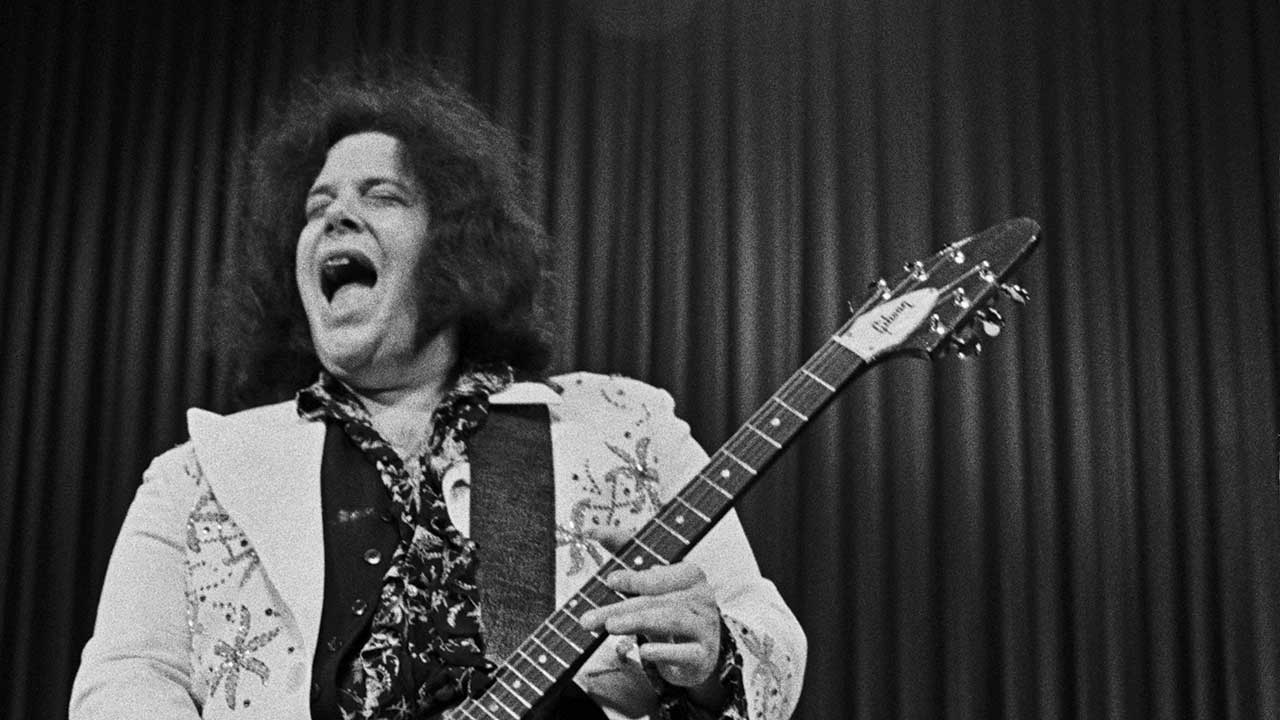A tribute to Mountain's Leslie West
Leslie West made his name in the early 70s with Mountain, Jeff Beck once describing him as “the greatest living guitarist in the world”

Best known for their 1970 hit Mississippi Queen, covered by artists as diverse as Ozzy Osbourne and Bachman-Turner Overdrive, Mountain made their mark at the Woodstock Festival in 1969, and went on to become one of the biggest attractions of the early 70s.
Their heavy, sludgy blues served as a template for heavy metal. After a combination of rock-star extravagance, drugs and rampant egos broke up the band after just three albums, the last being 1971’s Flowers Of Evil, West and Mountain drummer Corky Laing formed the power trio West, Bruce And Laing with ex-Cream bassist/ vocalist Jack Bruce.
Born Leslie Weinstein, West’s music career began when he joined Long Island rock’n’soulers The Vagrants after buying an electric guitar with the proceeds from his bar mitzvah. The Vagrants were produced by Felix Pappalardi, who had overseen Cream’s Disraeli Gears in 1967. Pappalardi produced West’s solo debut, Mountain, in ’69, and went on to become the bassist with the band of the same name. While they were recording at the Record Plant, Jimi Hendrix paid them a visit.
“Jimi said he loved the riff to Never In My Life. That kind of acknowledgement made me feel like hot shit – I stopped talking to all of my friends,” West would later joke.
The success of Mississippi Queen saw Mountain take off like a rocket. Their formula was simple: a mix of power and subtlety delivered in stripped-down form.
“I didn’t play fast, I only used the first and the third finger on the fingering hand,” West said in 2011. “I wanted to have the greatest, biggest tone, and I wanted vibrato like somebody who plays violin in a hundred-piece orchestra.”
West’s undoubted prowess as a player and writer – Jeff Beck once called him “the greatest living guitarist in the world” – served to overshadow another talent: his gruff yet soulful voice was every bit as striking as the riffs that served as the focal point.
Sign up below to get the latest from Classic Rock, plus exclusive special offers, direct to your inbox!
Leslie West was a big man. When he was playing with The Vagrants, wearing a feathered cape on stage, promoter Bill Graham likened him to a “three-hundred-pound psychedelic canary”.
“My weakness was cakes and pastries,” West offered. “Eventually they made me diabetic. I bought Krispy Kreme donuts by the dozen. When I’d finished the box I’d lick the glaze out of the bottom.”
Although he made a rod for his own back by titling his 1975 solo The Great Fatsby, West became frustrated when his physical size was the subject of more column inches than the music he made. The efforts of his label didn’t help.
“RCA Records came up with the brilliant idea of putting scales in the lobby of the Beacon Theater and inviting fans to guess my weight,” he recalled through gritted teeth. “I almost threw the goddamn thing through the doors and out on to Broadway.”
In ’71 The Who invited West to appear on their album Who’s Next. “Pete [Townshend] wanted me to play lead guitar, and my reply was: ‘What’s the matter with him playing it?’ But he only wanted to play rhythm,” West later explained. The results surfaced belatedly on an expanded edition of the album released in the 90s.
Many people forged an association with Mountain unknowingly, via a powerful snippet of the title track from their second album, Nantucket Sleighride, which was used as a theme tune to ITV’s political show Weekend World. The band knew nothing of this until they supported the newly reunited Deep Purple at Knebworth Park in 1985.
“A hundred thousand people started going crazy for Nantucket Sleighride, I couldn’t understand how they knew it,” West marvelled years later.
Over the years, Mountain would flit in and out of existence, West as the band’s curator, largely with Laing in tow. For a while West even stopped playing. It was seeing Eddie Van Halen for the first time that rejuvenated him to pick up a guitar again. The pair went on to develop a close friendship.
Felix Pappalardi was out of Mountain’s line-up when his wife Gail Collins shot and killed him in 1983. West and Laing were on their way to a gig in Indiana when they heard the news.
“Gail was fucked up on drugs. During an argument she shot Felix with a Derringer he’d actually bought for her. But then she said it was an accident,” West told Classic Rock with contempt. “That was bullshit. She’d also once pulled a gun on Corky’s wife.”
During his tenures with Mountain or West, Bruce And Laing the guitarist certainly burned the candle at both ends. “I’m sure a few people would say: ‘Leslie was out of his fucking mind, man,’” he said later. “I probably did do some crazy fucking things. But at least I’m here to talk to you about it.”
From the 1970s onwards Leslie was addicted to heroin, morphine and cocaine, although from 1986 onwards he cleaned up. “Instead of detoxing in twenty-eight days I did it over several years, at such a tiny decline [in dosage] that there were no symptoms,” he told Classic Rock in 2014. “Later I realised that I was taking such a very low amount, I guess it was like a placebo.”
In 2009, Johnny Winter’s manager Paul Nelson used the same procedure to cure Winter of his own addiction. Gradually Nelson cut the daily input of his boss until, West revealed, “Johnny asked how much Methadone he was taking, and Paul replied: ‘None. You’ve been clean for months.’ Johnny was incredibly grateful.”
Despite shedding weight in later years, plagued by diabetes West’s health declined. In the early 2000s he was suffering from bladder cancer. But worse was yet to come. In June 2011 doctors were forced to amputate his right leg at the knee after it turned blue during a 10-hour flight.
“They put me in a coma for four days,” West recalled. “My wife Jenni says: ‘If they don’t amputate your leg, you’re gonna lose your life.’ So I said to her: ‘Ah, do whatever you have to do’.”
Although he was fitted with a prosthetic limb he didn’t like wearing it, and touring became a trial.
“I’ve a vehicle called an MV-1, with two ramps that come out to drive the chair up,” West revealed to Classic Rock. “A four-hour drive is about all I can take without needing a rest. On stage I have electronic wheelchairs. Even with that I can’t go up too steep an incline, because I don’t want to fall. So it’s a little trippy to go out on tour.”
West continued to make solo records. His 2010 album Usual Suspects featured a cast of A-listers including Billy Gibbons, Slash, Zakk Wylde, Joe Bonamassa and Steve Lukather. Four years later, Soundcheck included cameos from Brian May, Peter Frampton and Jack Bruce on a live version of Spoonful. His 2013 album Still Climbing featured appearances by Johnny Winter, Johnny Lang, and Twisted Sister’s Dee Snider on vocals. The album also included a reprise of Long Red, a song that first appeared on West’s solo debut, Mountain, but had taken on a whole new popularity (as well as being covered by Mott The Hoople).
Sounding amazed, West told an interviewer: “Long Red is one of the most sampled songs in the history of hip-hop. Besides Jay Z and Kanye West, Lana Del Rey [sampled it], but they didn’t get clearance yet.” He added with a chuckle: “My lawyer’s right on that.”
Earlier in the noughties, Mountain’s fuzzed-up simplicity rubbed off on the likes of Kyuss, Monster Magnet and Queens Of The Stone Age.
Although West and Jack Bruce had their differences during the days of West Bruce & Laing, West remained fond of his former bandmate. “When Jack passed away [in 2014]… I still haven’t gotten over it,” he told Classic Rock.
There were opportunities to take things to higher levels, but West didn’t always make the best decisions. For example, after he had guested on West’s The Great Fatsby, Mick Jagger suggested that West should speak to Keith Richards about replacing the departing Mick Taylor in the Rolling Stones, but he didn’t make the call.
“The Stones were an English aristocratic band – a lot of guys were in the picture and it probably wouldn’t have worked out,” he shrugged. “But you never know.”
West’s spikiness subsided but he admitted that he wasn’t always the easiest of guys to work with. However, those lucky enough to have pierced the armour will testify that beneath it was a funny, loyal and immensely likable personality.
“I’m still a prick, these days I’m just a happy prick,” he told Classic Rock in 2003. “If the band are playing good and my guitar still makes my balls vibrate, then you can take every last thing I’ve got.”
With relations having deteriorated between West and Laing due to a dispute over Mississippi Queen, a version of Mountain last played live back in 2010.
Talking to Classic Rock in the wake of West's death in late 2020, Corky Laing said: “I consider myself a lucky sonofabitch to have been alongside Leslie during some brilliant moments that our final falling out could never erase. He was bigger than big and larger-than-life, so when things were great you could never get any better. But when things got dark, boy were they dark. I’m going to miss those good times. What an amazing human being he was.”
Long-time tour manager Paul Newcomb spoke to West days before he died. “It was the happiest I had heard Leslie in a long time,” Newcomb reveals. “He had bought an amazing property in Florida, concluded a deal on his back catalogue and had just got the go-ahead to record a new album.”
Alas, it was not meant to be.

Dave Ling was a co-founder of Classic Rock magazine. His words have appeared in a variety of music publications, including RAW, Kerrang!, Metal Hammer, Prog, Rock Candy, Fireworks and Sounds. Dave’s life was shaped in 1974 through the purchase of a copy of Sweet’s album ‘Sweet Fanny Adams’, along with early gig experiences from Status Quo, Rush, Iron Maiden, AC/DC, Yes and Queen. As a lifelong season ticket holder of Crystal Palace FC, he is completely incapable of uttering the word ‘Br***ton’.
